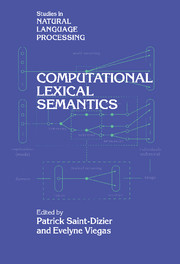Book contents
- Frontmatter
- Contents
- List of contributors
- Preface
- 1 An introduction to lexical semantics from a linguistic and a psycholinguistic perspective
- Part I Psycholinguistics for lexical semantics
- Part II Foundational issues in lexical semantics
- 4 Linguistic constraints on type coercion
- 5 From lexical semantics to text analysis
- 6 Lexical functions, generative lexicons and the world
- 7 Semantic features in a generic lexicon
- Part III Lexical databases
- Part IV Lexical semantics and artificial intelligence
- Part V Applications
- Part VI Computer models for lexical semantics
- Author index
- Subject index
5 - From lexical semantics to text analysis
Published online by Cambridge University Press: 29 September 2009
- Frontmatter
- Contents
- List of contributors
- Preface
- 1 An introduction to lexical semantics from a linguistic and a psycholinguistic perspective
- Part I Psycholinguistics for lexical semantics
- Part II Foundational issues in lexical semantics
- 4 Linguistic constraints on type coercion
- 5 From lexical semantics to text analysis
- 6 Lexical functions, generative lexicons and the world
- 7 Semantic features in a generic lexicon
- Part III Lexical databases
- Part IV Lexical semantics and artificial intelligence
- Part V Applications
- Part VI Computer models for lexical semantics
- Author index
- Subject index
Summary
Motivation
One of the major challenges today is coping with an overabundance of potentially important information. With newspapers such as the Wall Street Journal available electronically as a large text database, the analysis of natural language texts for the purpose of information retrieval has found renewed interest. Knowledge extraction and knowledge detection in large text databases are challenging problems, most recently under investigation in the TIPSTER projects funded by DARPA, the U.S. Department of Defense research funding agency. Traditionally, the parameters in the task of information retrieval are the style of analysis (statistical or linguistic), the domain of interest (TIPSTER, for instance, focuses on news concerning micro-chip design and joint ventures), the task (filling database entries, question answering, etc.), and the representation formalism (templates, Horn clauses, KL-ONE, etc.).
It is the premise of this chapter that much more detailed information can be gleaned from a careful linguistic analysis than from a statistical analysis. Moreover, a successful linguistic analysis provides more reliable data, as we hope to illustrate here. The problem is, however, that linguistic analysis is very costly and that systems that perform complete, reliable analysis of newspaper articles do not currently exist.
The challenge then is to find ways to do linguistic analysis when it is possible and to the extent that it is feasible. We claim that a promising approach is to perform a careful linguistic preprocessing of the texts, representing linguistically encoded information in a task independent, faithful, and reusable representation scheme.
- Type
- Chapter
- Information
- Computational Lexical Semantics , pp. 98 - 124Publisher: Cambridge University PressPrint publication year: 1995
- 2
- Cited by

